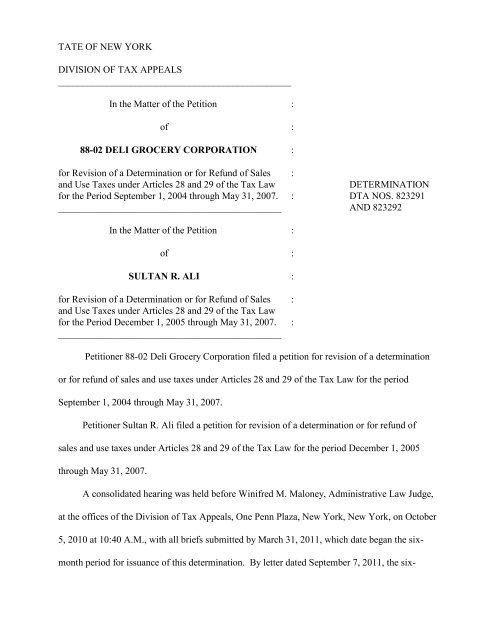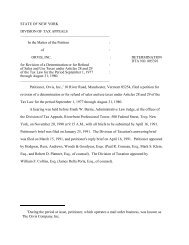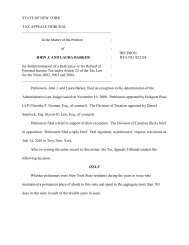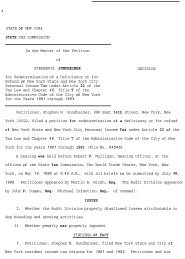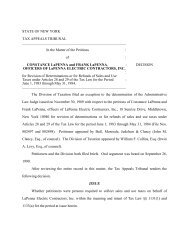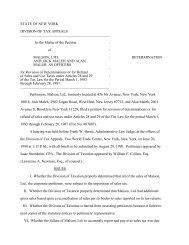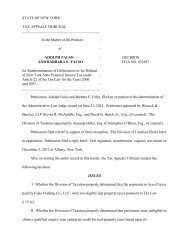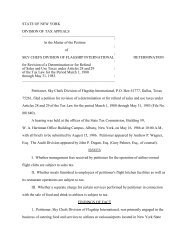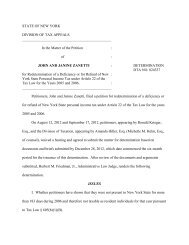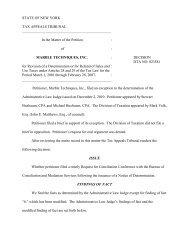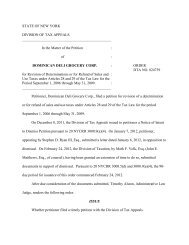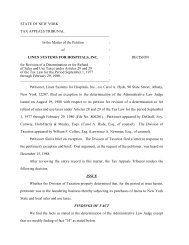TATE OF NEW YORK DIVISION OF TAX APPEALS In the Matter
TATE OF NEW YORK DIVISION OF TAX APPEALS In the Matter
TATE OF NEW YORK DIVISION OF TAX APPEALS In the Matter
You also want an ePaper? Increase the reach of your titles
YUMPU automatically turns print PDFs into web optimized ePapers that Google loves.
<strong>TATE</strong> <strong>OF</strong> <strong>NEW</strong> <strong>YORK</strong><br />
<strong>DIVISION</strong> <strong>OF</strong> <strong>TAX</strong> <strong>APPEALS</strong><br />
________________________________________________<br />
<strong>In</strong> <strong>the</strong> <strong>Matter</strong> of <strong>the</strong> Petition :<br />
of :<br />
88-02 DELI GROCERY CORPORATION :<br />
for Revision of a Determination or for Refund of Sales :<br />
and Use Taxes under Articles 28 and 29 of <strong>the</strong> Tax Law<br />
DETERMINATION<br />
for <strong>the</strong> Period September 1, 2004 through May 31, 2007. : DTA NOS. 823291<br />
______________________________________________ AND 823292<br />
<strong>In</strong> <strong>the</strong> <strong>Matter</strong> of <strong>the</strong> Petition :<br />
of :<br />
SULTAN R. ALI :<br />
for Revision of a Determination or for Refund of Sales :<br />
and Use Taxes under Articles 28 and 29 of <strong>the</strong> Tax Law<br />
for <strong>the</strong> Period December 1, 2005 through May 31, 2007. :<br />
______________________________________________<br />
Petitioner 88-02 Deli Grocery Corporation filed a petition for revision of a determination<br />
or for refund of sales and use taxes under Articles 28 and 29 of <strong>the</strong> Tax Law for <strong>the</strong> period<br />
September 1, 2004 through May 31, 2007.<br />
Petitioner Sultan R. Ali filed a petition for revision of a determination or for refund of<br />
sales and use taxes under Articles 28 and 29 of <strong>the</strong> Tax Law for <strong>the</strong> period December 1, 2005<br />
through May 31, 2007.<br />
A consolidated hearing was held before Winifred M. Maloney, Administrative Law Judge,<br />
at <strong>the</strong> offices of <strong>the</strong> Division of Tax Appeals, One Penn Plaza, New York, New York, on October<br />
5, 2010 at 10:40 A.M., with all briefs submitted by March 31, 2011, which date began <strong>the</strong> sixmonth<br />
period for issuance of this determination. By letter dated September 7, 2011, <strong>the</strong> six
-2<br />
month period was extended an additional three months (Tax Law § 2010[3]). Petitioners<br />
appeared by <strong>the</strong> Antonious Law Firm (Jacqueline S. Antonious, Esq., of counsel). The Division<br />
of Taxation appeared by Mark F. Volk, Esq. (Osborne K. Jack, Esq., of counsel).<br />
ISSUES<br />
I. Whe<strong>the</strong>r <strong>the</strong> Division of Taxation properly determined additional sales and use taxes<br />
due from petitioner 88-02 Deli Grocery Corporation.<br />
II. Whe<strong>the</strong>r penalties imposed under Tax Law § 1145(a)(1)(i) and (vi) should be canceled.<br />
FINDINGS <strong>OF</strong> FACT<br />
1. During <strong>the</strong> period in issue, petitioner 88-02 Deli Grocery Corporation (88-02 Deli<br />
Grocery) owned and operated a grocery and deli in Ozone Park, New York, making taxable sales<br />
of, among o<strong>the</strong>r things, beer, soda, cigarettes, sandwiches and coffee, and nontaxable sales of,<br />
among o<strong>the</strong>r things, food, milk and newspapers. 88-02 Deli Grocery had one cash register.<br />
2. 88-02 Deli Grocery was incorporated on June 9, 2004 and elected to be treated as a<br />
federal S corporation effective January 1, 2005. Petitioner Sultan R. Ali at all relevant times was<br />
president and 100% shareholder of 88-02 Deli Grocery.<br />
3. During <strong>the</strong> audit period at issue, consisting of 11 sales tax quarters (a period of 2 years<br />
and 9 months), 88-02 Deli Grocery reported on its sales tax returns total gross sales of<br />
$592,926.00 and total taxable sales of $189,260.00.<br />
4. By letter dated August 2, 2007, <strong>the</strong> Division of Taxation (Division) advised 88-02 Deli<br />
Grocery that a sales tax field audit of its books and records for <strong>the</strong> period September 1, 2004<br />
through May 31, 2007 would commence on August 27, 2007. This audit appointment letter<br />
advised 88-02 Deli Grocery that all of its books and records pertaining to its sales and use tax<br />
liability for <strong>the</strong> audit period should be available for review on <strong>the</strong> audit appointment date. An
-3<br />
attached Records Requested List specified a detailed listing of particular records that were to be<br />
available for <strong>the</strong> entire audit period, including sales tax returns; worksheets and canceled checks;<br />
federal income tax returns; New York State corporation tax returns; general ledger; general<br />
journal and closing entries; sales invoices; all exemption documents supporting nontaxable sales;<br />
chart of accounts; fixed asset purchase and sales invoices; expense purchase invoices;<br />
merchandise purchase invoices; bank statements, canceled checks and deposit slips; cash receipts<br />
journal; cash disbursements journal; <strong>the</strong> corporate book, including minutes, board of directors,<br />
and articles of incorporation; depreciation schedules, State Liquor Authority license; lease<br />
contracts; utility bills; guest checks; and cash register tapes.<br />
5. On August 23, 2007, <strong>the</strong> auditor mailed purchase confirmation letters to suppliers of<br />
beer, soda and tobacco. <strong>In</strong> September 2007, purchase confirmation information from third-party<br />
suppliers was received and transcribed by <strong>the</strong> auditor.<br />
6. At <strong>the</strong> request of <strong>the</strong> corporation’s former representative, Gregory Binkiewicz, CPA,<br />
<strong>the</strong> field audit appointment was rescheduled for October 10, 2007. The auditor, Rakesh Patel,<br />
met with Mr. Binkiewicz on October 10, 2007 and was provided with 88-02 Deli Grocery’s bank<br />
statements for <strong>the</strong> period September 1, 2004 through May 31, 2007, a few purchase invoices and<br />
copies of its federal income tax returns for <strong>the</strong> years 2004 (July 1, 2004 through December 31,<br />
2004), 2005 and 2006. The auditor also received a Responsible Person Questionnaire and a<br />
Sales Tax Examination Questionnaire completed by Mr. Binkiewicz.<br />
7. During <strong>the</strong> October 10, 2007 audit appointment, Mr. Binkiewicz executed a consent on<br />
behalf of <strong>the</strong> corporation extending <strong>the</strong> time for determination of sales and use taxes for <strong>the</strong><br />
period September 1, 2004 through May 31, 2005 until June 20, 2008. Subsequently, on April 22,<br />
2008, Mr. Binkiewicz executed a consent on behalf of <strong>the</strong> corporation extending <strong>the</strong> time for
-4<br />
determination of sales and use taxes for <strong>the</strong> period September 1, 2004 through November 30,<br />
2005 until December 20, 2008.<br />
8. At <strong>the</strong> October 10, 2007 audit appointment, Mr. Binkiewicz explained that he prepared<br />
88-02 Deli Grocery’s sales and use tax returns based upon estimated gross and taxable sales<br />
given to him by <strong>the</strong> corporation. Mr. Binkiewicz also explained that <strong>the</strong> corporation’s payroll<br />
was paid by cash and its purchases were paid by cash and check.<br />
9. During <strong>the</strong> October 10, 2007 audit appointment, <strong>the</strong> auditor transcribed bank deposits<br />
for <strong>the</strong> audit period. He also transcribed <strong>the</strong> addresses of <strong>the</strong> corporation’s suppliers listed on <strong>the</strong><br />
few purchase invoices provided. At <strong>the</strong> conclusion of <strong>the</strong> audit appointment, <strong>the</strong> auditor<br />
provided Mr. Binkiewicz with a handwritten list of records still required to complete <strong>the</strong> audit.<br />
This list included cash register tapes for <strong>the</strong> audit period; general ledger for <strong>the</strong> audit period; day<br />
book for <strong>the</strong> audit period; all canceled checks for <strong>the</strong> audit period; all purchase invoices for <strong>the</strong><br />
audit period; and any backup for <strong>the</strong> sales tax returns. The auditor also noted, on <strong>the</strong> list, that<br />
additional information might be requested as <strong>the</strong> sales tax audit progressed.<br />
10. Based upon <strong>the</strong> supplier information obtained during <strong>the</strong> October 10, 2007 audit<br />
appointment, <strong>the</strong> auditor sent out additional purchase confirmation requests.<br />
11. On October 23, 2007, <strong>the</strong> auditor sent a letter to Mr. Binkiewicz that confirmed <strong>the</strong><br />
next appointment scheduled for November 8, 2007. This letter also advised that all books and<br />
records as requested in <strong>the</strong> original appointment letter were to be produced at <strong>the</strong> November 8,<br />
2007 appointment. A copy of <strong>the</strong> original appointment letter was enclosed.<br />
12. On November 2, 2007, <strong>the</strong> auditor conducted a field survey of 88-02 Deli Grocery, a<br />
grocery store located on <strong>the</strong> corner of 88 th Street and Liberty Avenue, in Ozone Park. He noted<br />
that <strong>the</strong> grocery store, located on <strong>the</strong> same corner as <strong>the</strong> 88 th Street - Boyd Avenue subway
-5<br />
station, was open 24 hours a day. He observed that <strong>the</strong>re was one cash register, two employees,<br />
an 8-door refrigerator for beer located at <strong>the</strong> back of <strong>the</strong> store, and an 11-door refrigerator for<br />
o<strong>the</strong>r beverages located on <strong>the</strong> side of <strong>the</strong> store. Taxable items sold included, among o<strong>the</strong>r<br />
things, cigarettes, candy, sandwiches, coffee, beer, soda, detergent, and phone cards. Nontaxable<br />
items sold included, among o<strong>the</strong>r things, ice cream, chips, danish, newspapers, and juices.<br />
13. During <strong>the</strong> second field appointment conducted on November 8, 2007, Mr. Binkiewicz<br />
presented <strong>the</strong> sales tax returns; day books for <strong>the</strong> period September 1, 2004 through May 31,<br />
2007; some scattered purchase invoices; bank statements for <strong>the</strong> period September 1, 2004<br />
through May 31, 2007; <strong>the</strong> bill of sale; and <strong>the</strong> bulk sale notice (memo). No cash register tapes<br />
were presented during this audit appointment. The auditor transcribed <strong>the</strong> day books, which<br />
listed, by date, daily sales, total weekly gross sales and total weekly taxable sales. However, he<br />
was unable to trace any of <strong>the</strong> summarized transactions through to <strong>the</strong> sales tax returns or<br />
determine whe<strong>the</strong>r all of <strong>the</strong> transactions were entered in <strong>the</strong> day books because no source<br />
documents were presented.<br />
14. After reviewing <strong>the</strong> day books and <strong>the</strong> o<strong>the</strong>r records provided by 88-02 Deli Grocery,<br />
<strong>the</strong> auditor informed Mr. Binkiewicz that <strong>the</strong> records provided were inadequate for <strong>the</strong><br />
performance of a detailed audit, and that <strong>the</strong> Division would perform an observation of <strong>the</strong><br />
business to determine 88-02 Deli Grocery’s sales tax liability. By letter dated January 31, 2008,<br />
<strong>the</strong> auditor confirmed his recent conversation with Mr. Binkiewicz regarding <strong>the</strong> necessity to<br />
perform an observation of his former client’s business within <strong>the</strong> next six weeks.<br />
15. On February 7, 2008, <strong>the</strong> Division conducted an observation of 88-02 Deli Grocery’s<br />
business. The observation was conducted by three Division investigators, who wrote down each<br />
sale made between <strong>the</strong> hours of 7:00 A.M. and 7:00 P.M., when <strong>the</strong> business closed for <strong>the</strong> day.
-6<br />
Gross sales as observed totaled $982.54, and taxable sales as observed, including sales tax,<br />
totaled $741.61. After deducting sales tax of $62.11 from taxable sales as observed, <strong>the</strong> auditor<br />
determined net audited taxable sales of $679.50. He <strong>the</strong>n divided net audited taxable sales by 12<br />
(<strong>the</strong> number of hours observed) and computed net audited hourly taxable sales in <strong>the</strong> amount of<br />
$56.63. Based upon <strong>the</strong> auditor’s determination that 88-02 Deli Grocery was open 24 hours a<br />
day, he multiplied $56.63 by 24 and determined audited daily taxable sales to be $1,359.00. This<br />
amount was multiplied by 90 days in <strong>the</strong> sales tax quarter, resulting in audited quarterly taxable<br />
sales of $122,310.03. After multiplying audited quarterly taxable sales by 11 (<strong>the</strong> number of<br />
quarters in <strong>the</strong> audit period), <strong>the</strong> auditor determined total audited taxable sales to be<br />
$1,345,410.32 for <strong>the</strong> period September 1, 2004 through May 31, 2007. Then, he subtracted<br />
$189,260.00, total reported taxable sales for <strong>the</strong> audit period, from $1,345,410.32, and<br />
determined additional taxable sales to be $1,156,150.32. After applying <strong>the</strong> appropriate sales tax<br />
rate for each quarter, <strong>the</strong> auditor determined that $97,615.87 in additional sales tax was due for<br />
<strong>the</strong> period September 1, 2004 through May 31, 2007.<br />
16. During <strong>the</strong> audit, <strong>the</strong> auditor also reviewed 88-02 Deli Grocery’s federal income tax<br />
return filed for <strong>the</strong> year 2004 (July 1, 2004 through December 31, 2004) and determined that <strong>the</strong><br />
corporation purchased fixed assets in <strong>the</strong> amount of $10,000.00 during that year. Because <strong>the</strong><br />
corporation did not provide any invoice or o<strong>the</strong>r documentation showing that tax was paid on its<br />
purchase of <strong>the</strong> fixed assets, <strong>the</strong> auditor determined $863.00 in tax due on that purchase.<br />
17. After combining <strong>the</strong> additional tax due on fixed assets, $863.00, with <strong>the</strong> additional<br />
tax due on sales, $97,615.87, <strong>the</strong> auditor determined total additional tax due in <strong>the</strong> amount of<br />
$98,478.87 for <strong>the</strong> period September 1, 2004 through May 31, 2007.
-7<br />
18. A memo dated March 5, 2008 from <strong>the</strong> Division’s investigator, John Clerkin, stated<br />
that on Monday, March 3, 2008, he observed 88-02 Deli Grocery open at least until 11:05 P.M.<br />
19. At a field appointment on May 8, 2008, <strong>the</strong> auditor discussed his audit findings with<br />
Mr. Binkiewicz, who objected to <strong>the</strong> proposed audit adjustment stating that <strong>the</strong> business was not<br />
open 24 hours a day.<br />
20. On May 27, 2008, Mr. Binkiewicz advised <strong>the</strong> auditor that he no longer represented<br />
<strong>the</strong> corporation because it had retained new representation. Subsequently, <strong>the</strong> auditor received a<br />
power of attorney appointing Jacqueline S. Antonious, Esq., as <strong>the</strong> corporation’s representative.<br />
On June 3, 2008, <strong>the</strong> auditor mailed tax due worksheets to Ms. Antonious. Thereafter, at Ms.<br />
Antonious’s request, <strong>the</strong> auditor faxed a summary of third-party purchase confirmations to her.<br />
21. On August 14, 2008, Ms. Antonious faxed a letter with attachments to <strong>the</strong> auditor. <strong>In</strong><br />
her letter, Ms. Antonius advised that <strong>the</strong> store had undergone “some extensive expansion<br />
construction in late 2007, where <strong>the</strong> shelving space almost doubled in capacity.” Copies of three<br />
receipted invoices from Penn Glass Enterprises Ltd., dated October 18, 2007, November 21,<br />
2007 and December 4, 2007, were attached to <strong>the</strong> letter. Ms. Antonious also included a copy of<br />
<strong>the</strong> summary of <strong>the</strong> corporation’s purchases of Boar’s Head products for 2004 through 2007,<br />
which she received from Parziale Provisions.<br />
22. On August 26, 2008, Ms. Antonious met with <strong>the</strong> auditor at <strong>the</strong> Division’s Queens<br />
District Office. During that meeting, Ms. Antonious proposed that <strong>the</strong> auditor use 88-02 Deli<br />
Grocery’s purchases and a markup analysis to estimate <strong>the</strong> tax due for <strong>the</strong> audit period. <strong>In</strong><br />
support of her proposal, Ms. Antonious provided <strong>the</strong> auditor with a markup analysis of <strong>the</strong><br />
corporation’s purchases, which estimated that 88-02 Deli Grocery owed $7,079.16 in additional<br />
tax. No backup was provided for Ms. Antonious’s computation of tax due. At <strong>the</strong> conclusion of
-8<br />
that meeting, <strong>the</strong> auditor advised Ms. Antonious that <strong>the</strong> observation would be used because <strong>the</strong><br />
books and records provided were inadequate, and a summary of tax, interest and penalty<br />
worksheet was given to her.<br />
23. After modifying <strong>the</strong> tax due computation and summary of tax due to correct a<br />
ma<strong>the</strong>matical error, <strong>the</strong> auditor, on September 18, 2008, called Ms. Antonious to discuss <strong>the</strong><br />
corrected computation. 1 During that telephone call, Ms. Antonious advised that she did not have<br />
any additional information to submit and that she disagreed with <strong>the</strong> additional tax due. She also<br />
requested to go to <strong>the</strong> Bureau of Conciliation and Mediation Services.<br />
24. The Division subsequently issued to 88-02 Deli Grocery a Statement of Proposed<br />
Audit Change for Sales and Use Tax dated September 18, 2008, which asserted additional tax<br />
due on sales and fixed assets as noted above and <strong>the</strong>reby asserted a total of $98,478.89, plus<br />
penalty and interest. The proposed penalties were computed pursuant to Tax Law § 1145(a)(1)(i)<br />
and (vi). The auditor sent <strong>the</strong> statement and supporting tax due computation worksheets to Ms.<br />
Antonious.<br />
25. On September 23, 2008, <strong>the</strong> auditor received <strong>the</strong> disagreed Statement of Proposed<br />
Audit Change for Sales and Use Tax signed by Ms. Antonious, as well as a letter dated<br />
September 22, 2008 from Ms. Antonious. That letter stated <strong>the</strong> following reasons for<br />
disagreement:<br />
1. The assessment is based on an inaccurate calculation of a 24-hour business<br />
operation for <strong>the</strong> entire tax period, where in fact this business is an owner-run<br />
operation open on average 12 hours per day.<br />
2. The observation date of 2/07/08 is an inaccurate means to calculate accurate<br />
taxable sales during <strong>the</strong> tax period because <strong>the</strong> store underwent an expansive<br />
1<br />
A $0.02 addition error was made by <strong>the</strong> auditor when he originally computed <strong>the</strong> total additional tax due<br />
for <strong>the</strong> audit period.
-9<br />
construction project in late 2007, which expanded a considerable amount of<br />
storage area into <strong>the</strong> main store room and doubled <strong>the</strong> shelving area in <strong>the</strong> store.<br />
3. The assessment fails to take into account <strong>the</strong> actual taxable purchases found in<br />
<strong>the</strong> comprehensive list of purchase order invoices from <strong>the</strong> store’s suppliers.<br />
The letter also requested that <strong>the</strong> penalties be waived “because as <strong>the</strong> weight to <strong>the</strong> evidence will<br />
demonstrate, <strong>the</strong>re has not been more than a 25% under-reporting of taxable sales.”<br />
26. The Division issued a Notice of Determination to 88-02 Deli Grocery Corp., dated<br />
October 16, 2008, asserting additional sales and use taxes due in <strong>the</strong> amount of $98,478.89 for<br />
<strong>the</strong> period September 1, 2004 through May 31, 2007, plus penalty in <strong>the</strong> amount of $38,774.41<br />
and interest in <strong>the</strong> amount of $45,051.61 for a balance due of $182,304.91. On December 22,<br />
2008, <strong>the</strong> Division issued a Notice of Determination against Sultan R. Ali, as an officer or<br />
responsible person of 88-02 Deli Grocery Corp., asserting sales and use tax due of $52,815.06 for<br />
<strong>the</strong> period December 1, 2005 through May 31, 2007, plus penalty of $20,949.36 and interest of<br />
$19,041.40 for a balance due of $92,805.82. Each of <strong>the</strong> statutory notices assessed penalties<br />
pursuant to Tax Law § 1145(a)(1)(i) and (vi).<br />
27. At <strong>the</strong> hearing, <strong>the</strong> auditor testified that he determined that 88-02 Deli Grocery was<br />
open 24 hours a day based upon his November 2, 2007 field survey of <strong>the</strong> business and Mr.<br />
Clerkin’s memo regarding his March 3, 2008 observation of <strong>the</strong> business. However, because <strong>the</strong><br />
business was never actually observed for an entire 24-hour period and <strong>the</strong> audit file did not<br />
contain any proof supporting <strong>the</strong> auditor’s statement that <strong>the</strong> business was open 24 hours a day,<br />
<strong>the</strong> Division, at <strong>the</strong> hearing, adjusted <strong>the</strong> assessment to reflect additional tax due based upon a<br />
12-hour operation as follows. The adjustment from a 24-hour operation to a 12-hour operation<br />
reduced audited taxable sales from $1,345,410.32 to $672,705.16 for <strong>the</strong> period September 1,<br />
2004 through May 31, 2007. After subtracting $189,260.00, total reported taxable sales for <strong>the</strong>
-10<br />
audit period, from $672,705.16, <strong>the</strong> auditor determined revised additional taxable sales in <strong>the</strong><br />
amount of $483,445.16 and revised additional tax due from sales in <strong>the</strong> amount of $40,818.15 for<br />
<strong>the</strong> period September 1, 2004 through May 31, 2007. The auditor added $863.00, <strong>the</strong> additional<br />
tax due on fixed assets, to $40,818.15 and determined total revised additional tax due in <strong>the</strong><br />
amount of $41,681.15 for <strong>the</strong> period September 1, 2004 through May 31, 2007. The auditor<br />
fur<strong>the</strong>r reduced <strong>the</strong> revised additional tax due to $29,925.56 by allowing an additional prepaid<br />
cigarette sales tax credit of $10,097.34 and a tax credit of $1,658.25 for exempt food stamp sales.<br />
28. The additional prepaid cigarette sales tax credit was computed as follows. First, <strong>the</strong><br />
auditor multiplied 37, <strong>the</strong> number of packs of cigarettes sold on <strong>the</strong> day of <strong>the</strong> observation, by<br />
$0.36, <strong>the</strong> prepaid sales tax credit per pack, and determined <strong>the</strong> total daily cigarette sales tax<br />
credit to be $13.32. This amount was multiplied by seven days per week, resulting in a total<br />
weekly cigarette sales tax credit of $93.24. Then, <strong>the</strong> auditor multiplied $93.24 by 13 weeks per<br />
sales tax quarter, and determined <strong>the</strong> total quarterly cigarette sales tax credit to be $1,212.12.<br />
After multiplying <strong>the</strong> total quarterly cigarette sales tax credit by 11 (<strong>the</strong> number of quarters in <strong>the</strong><br />
audit period), <strong>the</strong> auditor determined <strong>the</strong> total cigarette sales tax credit to be $13,333.32 for <strong>the</strong><br />
period September 1, 2004 through May 31, 2007. He <strong>the</strong>n subtracted $3,236.00, <strong>the</strong> total<br />
reported cigarette sales tax credit for <strong>the</strong> audit period, from $13,333.32, and allowed an<br />
additional cigarette sales tax credit in <strong>the</strong> amount of $10,097.32 for <strong>the</strong> period September 1, 2004<br />
through May 31, 2007.<br />
29. With respect to <strong>the</strong> sales tax credit allowed for exempt food stamp sales, on March 13,<br />
2009, Ms. Antonious sent a letter, along with attachments, to <strong>the</strong> auditor’s supervisor, Theodore<br />
Bernstein, claiming that 88-02 Deli Grocery was entitled to exempt food stamp sales of<br />
$1,200.00 per month. Since <strong>the</strong> representative did not provide supporting documentation for <strong>the</strong>
-11<br />
entire audit period, <strong>the</strong> auditor refused to allow <strong>the</strong> claimed exempt food stamp sales. However,<br />
after discussions with Ms. Antonious and in an effort to be reasonable, <strong>the</strong> auditor allowed<br />
$600.00 of exempt food stamp sales per month. After multiplying $600.00 by 33, <strong>the</strong> number of<br />
months in <strong>the</strong> audit period, <strong>the</strong> auditor determined exempt food stamp sales to be $19,800.00.<br />
After multiplying $19,800.00 by a tax rate of 8.375%, <strong>the</strong> auditor allowed a sales tax credit for<br />
exempt food stamp sales in <strong>the</strong> amount of $1,658.25.<br />
30. Petitioners submitted <strong>the</strong> affidavit of Sultan R. Ali, <strong>the</strong> president and 100%<br />
shareholder of 88-02 Deli Grocery during <strong>the</strong> period at issue. <strong>In</strong> his affidavit, Mr. Ali asserted<br />
that <strong>the</strong> store is usually open 10 to 12 hours a day and that he runs <strong>the</strong> business by himself, but<br />
occasionally, he relies on family members to watch <strong>the</strong> store in his absence. Mr. Ali’s affidavit<br />
fur<strong>the</strong>r asserted that <strong>the</strong> auditor never requested to review any documents except for purchase<br />
invoices and federal tax returns; that <strong>the</strong> business’s cash register was incapable of producing<br />
receipts or cash register tapes, but he kept a daily record of total gross and taxable sales; that he<br />
objected to <strong>the</strong> observation being conducted without <strong>the</strong> presence of his accountant; that <strong>the</strong>re<br />
were food stamp sales on <strong>the</strong> date of <strong>the</strong> observation that <strong>the</strong> bank records of <strong>the</strong> “Efunds direct<br />
deposit for that day confirms”; that he purchases cigarettes from Sunrise and <strong>the</strong> third-party<br />
invoice summaries confirm <strong>the</strong> number of cartons purchased throughout <strong>the</strong> audit period; and<br />
that he made every effort to keep adequate books and records and to ensure that <strong>the</strong> proper<br />
amount of tax was reported. His affidavit also claimed that in late 2007, <strong>the</strong> business underwent<br />
an expansion, costing about $13,000.00, that resulted in increased sales. No exhibits were<br />
attached to Mr. Ali’s affidavit.<br />
31. Petitioners’ sole witness was Nashaat Antonious, an accountant retained by 88-02 Deli<br />
Grocery sometime in May 2008. At some point <strong>the</strong>reafter, Mr. Antonious reviewed <strong>the</strong>
-12<br />
corporation’s handwritten sales tax records for <strong>the</strong> audit period, and after organizing <strong>the</strong>m into<br />
“something readable,” he prepared a computerized summary of <strong>the</strong> corporation’s gross and<br />
taxable sales for <strong>the</strong> audit period. According to Mr. Antonious, <strong>the</strong> corporation’s day books were<br />
not given to him to review. The record includes an 11-page summary of gross and taxable sales<br />
for <strong>the</strong> audit period prepared by Mr. Antonious. The supporting documents used to prepare this<br />
summary are not part of <strong>the</strong> record. A comparison of quarterly sales contained in this summary<br />
to those reported on <strong>the</strong> sales and use tax returns filed by 88-02 Deli Corporation for <strong>the</strong> audit<br />
period indicates that <strong>the</strong>y are identical.<br />
32. A 17-page printout for “Customer: 235 DELI GROCERY CORP,” bearing a print date<br />
of July 19, 2010 was submitted into <strong>the</strong> record. This printout contained information regarding<br />
purchases made by that customer from September 1, 2004 through September 29, 2007,<br />
including, among o<strong>the</strong>r things, <strong>the</strong> date of each invoice, <strong>the</strong> invoice number, total due on <strong>the</strong><br />
invoice, amount paid, date paid, and <strong>the</strong> number of cigarettes purchased on each invoice. The<br />
following totals appear at <strong>the</strong> bottom of page 17 of <strong>the</strong> printout: “<strong>In</strong>voices: 951, Amt: 608510.71,<br />
Credits: 0.00, Cigs: 10439.” The name of <strong>the</strong> entity that prepared this printout, i.e., <strong>the</strong> seller,<br />
does not appear anywhere in <strong>the</strong> printout.<br />
33. According to Mr. Antonious, based on his review of <strong>the</strong> 17-page printout, petitioner<br />
purchased a total of 104,390 packs of cigarettes from Sunrise Candy & Tobacco Corp. (Sunrise)<br />
during <strong>the</strong> period September 1, 2004 through September 29, 2007, and <strong>the</strong>refore was entitled to a<br />
prepaid cigarette sales tax credit in <strong>the</strong> amount of $37,580.00 for that period. Mr. Antonious did<br />
not review any purchase invoices or o<strong>the</strong>r documents that indicated that 88-02 Deli Grocery<br />
purchased <strong>the</strong> cigarettes listed in <strong>the</strong> 17-page printout.
-13<br />
34. During <strong>the</strong> audit, <strong>the</strong> auditor received purchase confirmation information from nine<br />
vendors, including Sunrise. Audit work papers indicate that <strong>the</strong> nine vendors confirmed<br />
purchases by 88-02 Deli Grocery in <strong>the</strong> total amount of $537,247.99 during <strong>the</strong> period September<br />
1, 2004 through May 31, 2007. According to <strong>the</strong> purchase confirmation information provided to<br />
<strong>the</strong> auditor, monthly sales made by Sunrise to 88-02 Deli Grocery totaled $345,301.00 for <strong>the</strong><br />
period September 1, 2004 through April 30, 2007. The purchase confirmation information<br />
received from Sunrise did not include <strong>the</strong> number of packs of cigarettes purchased by 88-02 Deli<br />
Grocery during <strong>the</strong> period September 1, 2004 through April 30, 2007.<br />
35. The record does not include any purchase invoices from Sunrise for <strong>the</strong> period<br />
September 1, 2004 through May 31, 2007. No purchase invoices reflecting 88-02 Deli<br />
Grocery’s purchases of cigarettes from any third party are part of <strong>the</strong> record.<br />
36. On its federal income tax returns filed for <strong>the</strong> years 2004 through 2007, 88-02 Deli-<br />
Grocery reported inventory purchases in <strong>the</strong> total amount of $494,819.00 for those years.<br />
37. 88-02 Deli Grocery’s checking account statement for <strong>the</strong> period January 16, 2008<br />
through February 13, 2008 listed a deposit in <strong>the</strong> amount of $42.09 by “Efunds Corp Dly Settle”<br />
on February 7, 2008. According to Mr. Antonious, that Efunds Corp. direct deposit indicated<br />
that 88-02 Deli Grocery made exempt food stamp sales of $42.09 during <strong>the</strong> observation<br />
conducted on February 7, 2008. He <strong>the</strong>n surmised that if that amount was extrapolated over <strong>the</strong><br />
audit period, <strong>the</strong> corporation would be entitled to a sales tax credit for exempt food stamp sales<br />
of about $4,000.00. Mr. Antonious did not review any documents that indicated that <strong>the</strong> Efunds<br />
Corp. direct deposit on February 7, 2008 was for exempt food stamp sales made on <strong>the</strong> date of<br />
<strong>the</strong> observation.<br />
38. The record includes <strong>the</strong> ledger sheets handwritten by <strong>the</strong> investigators during <strong>the</strong>ir
-14<br />
February 7, 2008 observation of 88-02 Deli Grocery’s sales. These ledger sheets contain<br />
information concerning <strong>the</strong> investigators’ observation of sales, including <strong>the</strong> time of <strong>the</strong> sale, a<br />
description of <strong>the</strong> items sold, <strong>the</strong> cost of any cigarettes sold, <strong>the</strong> nontaxable amount of <strong>the</strong> sale,<br />
<strong>the</strong> taxable amount of <strong>the</strong> sale, and <strong>the</strong> total amount of <strong>the</strong> sale. No payments by food stamps<br />
were noted on <strong>the</strong>se handwritten ledger sheets.<br />
39. At <strong>the</strong> hearing, <strong>the</strong> auditor admitted that he did not know how <strong>the</strong> United States<br />
Department of Agriculture (USDA) credits food stamp purchases to retail food stores approved<br />
to participate in <strong>the</strong> federal food stamp program.<br />
40. The record includes 88-02 Deli Grocery’s checking account statements for <strong>the</strong> period<br />
August 12, 2006 through April 12, 2007. Numerous direct deposits made by Efunds Corp. were<br />
listed on each of <strong>the</strong>se checking account statements.<br />
41. The record does not include any receipts, books or records that show what items were<br />
purchased with food stamps (taxable and nontaxable) ei<strong>the</strong>r during <strong>the</strong> audit period or on <strong>the</strong> date<br />
of <strong>the</strong> observation, i.e., February 7, 2008.<br />
42. The record includes an invoice dated August 17, 2004 issued to “88-02 Grocery<br />
Corp.” by Zaid Repair and Maintenance Services, of Brooklyn, New York. This invoice reflects<br />
a total charge of $10,000.00 to “repair and fix wall, floor and celling [sic],” a deposit of<br />
$2,500.00 and a balance due of $7,500.00. “Paid” is handwritten at <strong>the</strong> bottom of this invoice.<br />
The record does not include any canceled checks, bank statements or receipts verifying payment<br />
of such invoice. There is also no detailed list of <strong>the</strong> date, location and type of work performed,<br />
and <strong>the</strong> materials used in such work.<br />
43. As part of its federal income tax return filed for <strong>the</strong> year 2004, 88-02 Deli Grocery<br />
completed Schedule L, Balance Sheets per Books, on which it reported no buildings and o<strong>the</strong>r
-15<br />
depreciable assets at <strong>the</strong> beginning of <strong>the</strong> tax year, and buildings and o<strong>the</strong>r depreciable assets of<br />
$10,000.00 less accumulated depreciation of $1,000.00, or $9,000.00, at <strong>the</strong> end of <strong>the</strong> tax year.<br />
A depreciation deduction in <strong>the</strong> amount of $1,000.00 was claimed by <strong>the</strong> corporation on its 2004<br />
federal income tax return. No supporting depreciation worksheet was attached to this return.<br />
44. On each of its federal income tax returns filed for <strong>the</strong> years 2004, 2005, 2006 and<br />
2007, 88-02 Deli Grocery claimed a deduction for rents paid. The record does not include a copy<br />
of <strong>the</strong> lease for <strong>the</strong> business premises.<br />
CONCLUSIONS <strong>OF</strong> LAW<br />
A. Tax Law § 1105(a) imposes a sales tax on <strong>the</strong> receipts from every “retail sale” of<br />
tangible personal property except as o<strong>the</strong>rwise provided in Article 28 of <strong>the</strong> Tax Law. A “retail<br />
sale” is a “sale of tangible personal property to any person for any purpose, o<strong>the</strong>r than . . . for<br />
resale as such . . .” (Tax Law § 1101[b][4][i]).<br />
B. Tax Law § 1135(a)(1) provides that<br />
[e]very person required to collect tax shall keep records of every sale . . . and of<br />
all amounts paid, charged or due <strong>the</strong>reon and of <strong>the</strong> tax payable <strong>the</strong>reon, in such<br />
form as <strong>the</strong> commissioner of taxation and finance may by regulation require.<br />
Such records shall include a true copy of each sales slip, invoice, receipt,<br />
statement or memorandum upon which subdivision (a) of section eleven hundred<br />
thirty-two requires that <strong>the</strong> tax be stated separately.<br />
The sales records required to be maintained include, among o<strong>the</strong>r things, sales slips,<br />
invoices, receipts, statements or o<strong>the</strong>r memoranda of sale, guest checks, cash register tapes and<br />
any o<strong>the</strong>r original sales documents (20 NYCRR 533.2[b][1]). When no written document is<br />
given to <strong>the</strong> customer, <strong>the</strong> seller is required to keep a daily record of all such cash and credit sales<br />
in a day book or similar book (20 NYCRR 533.2[b][1][iii]).<br />
C. Tax Law § 1138(a)(1) provides, in relevant part, that if a sales tax return was not filed,
“or if a return when filed [was] incorrect or insufficient, <strong>the</strong> amount of tax due shall be<br />
determined [by <strong>the</strong> Division of Taxation] from such information as may be available. If<br />
necessary, <strong>the</strong> tax may be estimated on <strong>the</strong> basis of external indices . . . .” (Tax Law §<br />
1138[a][1].) When acting pursuant to section 1138(a)(1), <strong>the</strong> Division is required to select a<br />
-16<br />
method reasonably calculated to reflect <strong>the</strong> tax due. The burden <strong>the</strong>n rests upon <strong>the</strong> taxpayer to<br />
demonstrate that <strong>the</strong> method of audit or <strong>the</strong> amount of <strong>the</strong> assessment was erroneous (see <strong>Matter</strong><br />
of Your Own Choice, <strong>In</strong>c., Tax Appeals Tribunal, February 20, 2003).<br />
D. The standard for reviewing a sales tax audit where external indices were employed was<br />
set forth in <strong>Matter</strong> of Your Own Choice, <strong>In</strong>c., as follows:<br />
To determine <strong>the</strong> adequacy of a taxpayer’s records, <strong>the</strong> Division must first<br />
request (<strong>Matter</strong> of Christ Cella, <strong>In</strong>c. v. State Tax Commn., [102 AD2d 352, 477<br />
NYS2d 858] supra) and thoroughly examine (<strong>Matter</strong> of King Crab Rest. v. Chu,<br />
134 AD2d 51, 522 NYS2d 978) <strong>the</strong> taxpayer’s books and records for <strong>the</strong> entire<br />
period of <strong>the</strong> proposed assessment (<strong>Matter</strong> of Adamides v. Chu, 134 AD2d 776,<br />
521 NYS2d 826, lv denied 71 NY2d 806, 530 NYS2d 109). The purpose of <strong>the</strong><br />
examination is to determine, through verification drawn independently from<br />
within <strong>the</strong>se records (<strong>Matter</strong> of Giordano v. State Tax Commn., 145 AD2d 726,<br />
535 NYS2d 255; <strong>Matter</strong> of Urban Liqs. v. State Tax Commn., 90 AD2d 576, 456<br />
NYS2d 138; <strong>Matter</strong> of Meyer v. State Tax Commn., 61 AD2d 223, 402 NYS2d<br />
74, lv denied 44 NY2d 645, 406 NYS2d 1025; see also, <strong>Matter</strong> of Hennekens v.<br />
State Tax Commn., 114 AD2d 599, 494 NYS2d 208), that <strong>the</strong>y are, in fact, so<br />
insufficient that it is ‘virtually impossible [for <strong>the</strong> Division of Taxation] to verify<br />
taxable sales receipts and conduct a complete audit’ (<strong>Matter</strong> of Chartair, <strong>In</strong>c. v.<br />
State Tax Commn., 65 AD2d 44, 411 NYS2d 41, 43; <strong>Matter</strong> of Christ Cella, <strong>In</strong>c.<br />
v. State Tax Commn., supra), ‘from which <strong>the</strong> exact amount of tax due can be<br />
determined’ (<strong>Matter</strong> of Mohawk Airlines v. Tully, 75 AD2d 249, 429 NYS2d<br />
759, 760).<br />
Where <strong>the</strong> Division follows this procedure, <strong>the</strong>reby demonstrating that <strong>the</strong><br />
records are incomplete or inaccurate, <strong>the</strong> Division may resort to external indices to<br />
estimate tax (<strong>Matter</strong> of Urban Liqs. v. State Tax Commn., supra). The estimate<br />
methodology utilized must be reasonably calculated to reflect taxes due (<strong>Matter</strong> of<br />
W. T. Grant Co. v. Joseph, 2 NY2d 196, 159 NYS2d 150, cert denied 355 US<br />
869, 2 L Ed 2d 75), but exactness in <strong>the</strong> outcome of <strong>the</strong> audit method is not<br />
required (<strong>Matter</strong> of Markowitz v. State Tax Commn., 54 AD2d 1023, 388<br />
NYS2d 176, affd 44 NY2d 684, 405 NYS2d 454; <strong>Matter</strong> of Cinelli, Tax Appeals
-17<br />
Tribunal, September 14, 1989). The taxpayer bears <strong>the</strong> burden of proving with<br />
clear and convincing evidence that <strong>the</strong> assessment is erroneous (<strong>Matter</strong> of<br />
Scarpulla v. State Tax Commn., 120 AD2d 842, 502 NYS2d 113) or that <strong>the</strong><br />
audit methodology is unreasonable (<strong>Matter</strong> of Surface Line Operators Fraternal<br />
Org. v. Tully, 85 AD2d 858, 446 NYS2d 451; <strong>Matter</strong> of Cousins Serv. Station,<br />
Tax Appeals Tribunal, August 11, 1988). <strong>In</strong> addition, ‘[c]onsiderable latitude is<br />
given an auditor’s method of estimating sales under such circumstances as exist in<br />
[each] case’ (<strong>Matter</strong> of Grecian Sq. v. New York State Tax Commn., 119 AD2d<br />
948, 501 NYS2d 219, 221).<br />
E. <strong>In</strong> this matter, <strong>the</strong> Division made written and oral requests for 88-02 Deli Grocery’s<br />
books and records. <strong>In</strong> response, <strong>the</strong> corporation’s first representative supplied some purchase<br />
invoices, bank statements for <strong>the</strong> audit period, sales tax returns, <strong>the</strong> corporation’s federal income<br />
tax returns for <strong>the</strong> years 2004, 2005 and 2006, and day books that summarized <strong>the</strong> corporation’s<br />
sales for <strong>the</strong> audit period. Subsequently, 88-02 Deli Grocery’s second (and current)<br />
representative supplied three invoices from Penn Glass Enterprises, <strong>In</strong>c., dated October 18, 2007,<br />
November 21, 2007 and December 4, 2007, a summary of Boar’s Head product purchases for<br />
2004 through 2007 received from Parziale Provisions, and a computation of tax due based upon a<br />
markup analysis of purchases prepared by <strong>the</strong> current representative. No cash register tapes, or<br />
o<strong>the</strong>r source documents to substantiate sales were provided to <strong>the</strong> auditor. Clearly, <strong>the</strong> records<br />
provided were insufficient to verify gross and taxable sales and to conduct a complete audit from<br />
which <strong>the</strong> exact amount of tax due could have been determined. Accordingly, it was proper for<br />
<strong>the</strong> Division to resort to <strong>the</strong> use of external indices (<strong>Matter</strong> of Karay Restaurant Corp. v. Tax<br />
Appeals Tribunal, 274 AD2d 854, 711 NYS2d 853 [2000], lv denied 96 NY2d 702, 722 NYS2d<br />
794 [2001]; <strong>Matter</strong> of Sarantopoulos v. Tax Appeals Tribunal, 186 AD2d 878, 589 NYS2d 102<br />
[1992]). The courts have upheld <strong>the</strong> use of observation tests as an external index and have found<br />
it reasonable to extrapolate <strong>the</strong> results of a one-day observation test over a multi-year audit<br />
period (see <strong>Matter</strong> of Del’s Mini Deli v. Commr. of Taxation and Finance, 205 AD2d 989, 613
-18<br />
967 [1994]; <strong>Matter</strong> of Sarantopoulos v. Tax Appeals Tribunal; <strong>Matter</strong> of Vebol Edibles v. Tax<br />
Appeals Tribunal, 162 AD2d 765, 557 NYS2d 678 [1990], lv denied 77 NY2d 803, 567 NYS2d<br />
643 [1991]). Accordingly, it was reasonable to utilize an observation test to estimate 88-02 Deli<br />
Grocery’s sales and <strong>the</strong> resultant sales tax liability (see <strong>Matter</strong> of Marte, Tax Appeals Tribunal,<br />
August 5, 2004; <strong>Matter</strong> of Himed Deli Corp., Tax Appeals Tribunal, March 30, 2000). <strong>In</strong> view<br />
of <strong>the</strong> foregoing, <strong>the</strong> only questions presented in this case are whe<strong>the</strong>r petitioners have<br />
established that <strong>the</strong> audit method was unreasonable and whe<strong>the</strong>r <strong>the</strong> amount of tax assessed as a<br />
result of <strong>the</strong> application of <strong>the</strong> method used in this case was erroneous (<strong>Matter</strong> of Surface Line<br />
Operators Fraternal Organization v. Tully).<br />
F. As noted in <strong>the</strong> Findings of Fact, <strong>the</strong> Division at <strong>the</strong> hearing revised its assessment to<br />
reflect additional tax due based upon a 12-hour daily operation of 88-02 Deli Grocery’s business<br />
during <strong>the</strong> audit period, ra<strong>the</strong>r than <strong>the</strong> 24-hour daily operation of <strong>the</strong> business determined at<br />
audit. As a result of <strong>the</strong> reduction in hours of operation, <strong>the</strong> auditor determined revised<br />
additional taxable sales in <strong>the</strong> amount of $483,445.16 and revised additional tax due from sales<br />
in <strong>the</strong> amount of $40,818.15 for <strong>the</strong> period September 1, 2004 through May 31, 2007. The<br />
auditor added $863.00, <strong>the</strong> additional tax due on fixed assets, to $40,818.15 and determined total<br />
revised additional tax due in <strong>the</strong> amount of $41,681.15 for <strong>the</strong> period September 1, 2004 through<br />
May 31, 2007. The auditor fur<strong>the</strong>r reduced <strong>the</strong> revised additional tax due to $29,925.56 by<br />
allowing an additional prepaid cigarette sales tax credit of $10,097.34 and a sales tax credit of<br />
$1,658.25 for exempt food stamp sales.<br />
G. Petitioners contend that <strong>the</strong> Division’s use of <strong>the</strong> number of packs of cigarettes sold on<br />
<strong>the</strong> day of <strong>the</strong> observation in its computations of <strong>the</strong> additional prepaid cigarette sales tax credit<br />
allowed for <strong>the</strong> period September 1, 2004 through May 31, 2007 was erroneous. Petitioners
-19<br />
maintain that <strong>the</strong> 17-page summary of purchase invoices from Sunrise clearly confirms that 88<br />
02 Deli Grocery paid Sunrise $532,013.60 for 9,166 cartons of cigarettes purchased from<br />
September 1, 2004 through May 31, 2007, and that <strong>the</strong> corporation actually paid a total of<br />
$32,997.60 in prepaid sales tax on those cigarettes during <strong>the</strong> audit period. Since 88-02 Deli<br />
Grocery reported a prepaid cigarette sales tax credit of $3,236.00 on its sales tax returns, <strong>the</strong>y<br />
fur<strong>the</strong>r maintain that <strong>the</strong> corporation is due a total prepaid cigarette sales tax credit of $29,761.60<br />
($32,997.60 - $3,236.00). With respect to <strong>the</strong> revised assessment, petitioners claim that 88-02<br />
Deli Grocery is entitled to an additional prepaid cigarette sales tax credit in <strong>the</strong> amount of<br />
$19,664.28 ($29,761.60 - $10,097.32). Petitioners’ argument is without merit. The<br />
documentation submitted is woefully inadequate. The 17-page printout does not contain <strong>the</strong><br />
name of <strong>the</strong> seller or <strong>the</strong> number of packs of cigarettes sold during <strong>the</strong> audit period. <strong>In</strong> addition,<br />
none of <strong>the</strong> purchase invoices referenced in <strong>the</strong> 17-page printout are part of <strong>the</strong> record. <strong>In</strong>deed,<br />
no purchase invoices reflecting 88-02 Deli Grocery’s purchases of packs of cigarettes from any<br />
third party are part of <strong>the</strong> record. It is noted that <strong>the</strong> number of packs of cigarettes purchased by<br />
88-02 Deli Grocery was not included in <strong>the</strong> purchase confirmation information that Sunrise<br />
supplied to <strong>the</strong> auditor. Given <strong>the</strong> lack of information regarding <strong>the</strong> specific number of packs of<br />
cigarettes purchased by 88-02 Deli Grocery during <strong>the</strong> audit period, <strong>the</strong> Division’s use of <strong>the</strong><br />
number of packs of cigarettes sold on <strong>the</strong> day of <strong>the</strong> observation, in its computations of <strong>the</strong><br />
additional prepaid cigarette sales tax credit allowed, was reasonable. As such, no adjustment is<br />
warranted in <strong>the</strong> Division’s computation of <strong>the</strong> additional prepaid cigarette sales tax credit.<br />
H. Petitioners contend that <strong>the</strong> Division’s use of $600.00 as <strong>the</strong> monthly amount of<br />
exempt food stamp sales, in its computation of <strong>the</strong> sales tax credit for exempt food stamp sales<br />
allowed, was arbitrary and unreasonably inflated <strong>the</strong> revised amount of additional tax due for <strong>the</strong>
-20<br />
audit period. Since <strong>the</strong> revised computations of additional taxable sales and additional tax due<br />
for <strong>the</strong> audit period were based upon sales data obtained during <strong>the</strong> 12-hour observation<br />
conducted on February 7, 2008, petitioners maintain that <strong>the</strong> amount of food stamp sales made on<br />
that date should be used to compute <strong>the</strong> sales tax credit for exempt food stamp sales allowed for<br />
<strong>the</strong> audit period. They fur<strong>the</strong>r maintain that <strong>the</strong> corporation’s checking account statement for <strong>the</strong><br />
period January 16, 2008 through February 13, 2008 clearly shows that $42.09 in food stamp<br />
sales, via <strong>the</strong> USDA’s third-party direct depositor, Efunds Corp., were collected on February 7,<br />
2008. Given <strong>the</strong> Division’s investigators failure to note taxable and nontaxable sales paid by<br />
food stamps in <strong>the</strong>ir ledger sheets, and in <strong>the</strong> interest of justice, petitioners claim that <strong>the</strong> entire<br />
$42.09 should be considered daily exempt food stamp sales and <strong>the</strong> sales tax credit for exempt<br />
food stamp sales should be recomputed accordingly. They fur<strong>the</strong>r claim that <strong>the</strong> use of $42.09<br />
would “rightly place <strong>the</strong> burden on auditors conducting observations to properly calculate and<br />
account for food stamp sales,” and prevent <strong>the</strong> manipulation of data where a taxpayer lacks<br />
sufficient records and is unable to prove with exactness <strong>the</strong> extent of <strong>the</strong> auditor’s error.<br />
Contrary to petitioners’ claim, it was 88-02 Deli Grocery’s responsibility to maintain<br />
records of food stamp sales on <strong>the</strong> date of <strong>the</strong> observation. 20 NYCRR 533.2(d)(7) required 88<br />
02 Deli Grocery to maintain records of food stamp sales as follows:<br />
Records. <strong>In</strong> addition to <strong>the</strong> records required to be kept pursuant to this section,<br />
retail food stores and o<strong>the</strong>r participants approved for participation in <strong>the</strong> federal<br />
food stamp program are required to keep and make available to <strong>the</strong> department<br />
upon request <strong>the</strong> following:<br />
* * *<br />
(ii) records of receipts indicating whe<strong>the</strong>r payment is by food stamps; and<br />
(iii) true and complete copies of redemption certificates, validated by <strong>the</strong><br />
bank; or true and complete copies of bank deposit slips or receipts showing <strong>the</strong>
-21<br />
amount of food stamps deposited with, cashed at or o<strong>the</strong>rwise tendered to <strong>the</strong><br />
bank, validated by <strong>the</strong> bank; or both such redemption certificates and deposit slips<br />
or receipts, if available; and any o<strong>the</strong>r document validated by a bank as to <strong>the</strong><br />
amount of food stamps deposited, cashed or o<strong>the</strong>rwise tendered.<br />
The only documentation submitted by petitioners, concerning 88-02 Deli Grocery’s food<br />
stamp sales on February 7, 2008, was <strong>the</strong> corporation’s checking account statement for <strong>the</strong> period<br />
January 18, 2008 through February 13, 2008. Petitioners did not submit any records to show<br />
what items were purchased with food stamps (taxable and nontaxable) and in what quantities on<br />
February 7, 2008. Because <strong>the</strong> corporation’s checking account statement merely indicates <strong>the</strong><br />
amount of <strong>the</strong> food stamp direct deposit on February 7, 2008, it is impossible to determine <strong>the</strong><br />
exempt amount of food stamp sales on that date. It is noted that despite <strong>the</strong> fact that he did not<br />
receive sufficient documentation to support 88-02 Deli Grocery’s claimed monthly exempt food<br />
stamp sales, <strong>the</strong> auditor, in an effort to be reasonable, determined exempt food stamp sales to be<br />
$19,800.00 for <strong>the</strong> period September 1, 2004 through May 31, 2007 and allowed a sales tax<br />
credit for exempt food stamps sales for that period. As such, no adjustment is warranted to <strong>the</strong><br />
Division’s determination of 88-02 Deli Grocery’s exempt food stamp sales for <strong>the</strong> audit period.<br />
I. Petitioners contend that <strong>the</strong> Division erroneously assessed tax on <strong>the</strong> fixed assets<br />
acquired by 88-02 Deli Grocery in 2004. They claim that documentation, including an invoice<br />
issued by Zaid Repair and Maintenance Services dated August 14, 2004 and <strong>the</strong> affidavit of<br />
petitioner Sultan R. Ali, clearly establishes that <strong>the</strong> $10,000.00, listed on Schedule L (Balance<br />
Sheets per Books) of 88-02 Deli Grocery’s 2004 federal income tax return, was spent on a<br />
construction project for <strong>the</strong> repair and expansion of <strong>the</strong> store prior to <strong>the</strong> beginning of <strong>the</strong> audit<br />
period, and <strong>the</strong>refore, was not subject to tax during <strong>the</strong> audit period. After reviewing <strong>the</strong><br />
documentation presented, I find that <strong>the</strong> Division correctly determined that tax was due on 88-02
-22<br />
Deli Grocery’s purchase of fixed assets in 2004. The invoice issued by Zaid Repair and<br />
Maintenance Services contains only a vague, general description of work allegedly performed.<br />
There are no details regarding <strong>the</strong> work allegedly performed, including <strong>the</strong> dates it was<br />
performed, <strong>the</strong> materials used, and <strong>the</strong> location and type of such work. O<strong>the</strong>r than <strong>the</strong><br />
handwritten notation “paid” on this invoice, <strong>the</strong>re is no supporting documentation of such<br />
payment by 88-02 Deli Grocery. The record also does not include a copy of <strong>the</strong> lease for 88-02<br />
Deli Grocery’s rental of <strong>the</strong> store. As for petitioner Sultan R. Ali’s affidavit, it does not contain<br />
any reference to a 2004 construction project at <strong>the</strong> business premises. Therefore, I find that <strong>the</strong><br />
Division properly determined that 88-02 Deli Grocery’s purchase of fixed assets in 2004 was<br />
subject to tax.<br />
J. The Division asserted penalty herein pursuant to Tax Law § 1145(a)(1)(i) and (vi). Tax<br />
Law § 1145(a)(1)(i) states that any person failing to file a return or pay over any sales or use tax<br />
“shall” be subject to a penalty. This penalty may be canceled if <strong>the</strong> failure was “due to<br />
reasonable cause and not due to willful neglect” (Tax Law § 1145[a][1][iii]). Consistent with<br />
this statute, <strong>the</strong> Division’s regulations provide that penalty imposed under Tax Law §<br />
1145(a)(1)(i) “must be imposed unless it is shown that such failure was due to reasonable cause<br />
and not due to willful neglect” (20 NYCRR 2392.1[a][1]).<br />
Tax Law § 1145(a)(1)(vi) states that any person who omits from <strong>the</strong> total amount of tax<br />
required to be shown on a sales tax return an amount which is in excess of 25 percent of such<br />
total amount “shall be subject to a penalty equal to ten percent of <strong>the</strong> amount of such omission.”<br />
Like <strong>the</strong> penalties imposed under Tax Law § 1145(a)(1)(i), penalties imposed under section<br />
1145(a)(1)(vi) must be sustained unless <strong>the</strong> failure was due to reasonable cause and not due to<br />
willful neglect.
-23<br />
K. Petitioners have not provided evidence or arguments sufficient to constitute reasonable<br />
cause or support abatement or cancellation of penalties. <strong>In</strong> establishing reasonable cause for<br />
penalty abatement, <strong>the</strong> taxpayer faces an onerous task (<strong>Matter</strong> of Philip Morris, Tax Appeals<br />
Tribunal, April 29, 1993). Referring to <strong>the</strong> mandatory language of Tax Law § 1145(a)(1)(i), <strong>the</strong><br />
Tribunal stated that “<strong>the</strong> Legislature evidenced its intent that filing returns and paying tax<br />
according to a particular timetable be treated as a largely unavoidable obligation” (<strong>Matter</strong> of<br />
MCI Telecommunications Corp., Tax Appeals Tribunal, January 16, 1992). <strong>In</strong> this case,<br />
petitioners nei<strong>the</strong>r maintained nor produced records as required, and those records petitioners did<br />
keep were without source documentation to establish <strong>the</strong> veracity of <strong>the</strong> information set forth<br />
<strong>the</strong>rein. Fur<strong>the</strong>rmore, taxable sales determined on audit, as revised at <strong>the</strong> hearing, were far in<br />
excess of taxable sales reported. Under <strong>the</strong>se circumstances, penalties must be sustained.<br />
L. The petitions of 88-02 Deli Grocery Corporation and Sultan R. Ali are granted to <strong>the</strong><br />
extent indicated in Conclusion of Law F; <strong>the</strong> Division of Taxation is hereby directed to modify<br />
<strong>the</strong> notices of determination issued to petitioner 88-02 Deli Grocery Corporation on October 16,<br />
2008 and to petitioner Sultan R. Ali on December 22, 2008 accordingly; and, except as so<br />
granted, <strong>the</strong> petitions are in all o<strong>the</strong>r respects denied.<br />
DATED: Troy, New York<br />
September 22, 2011<br />
/s/ Winifred M. Maloney<br />
ADMINISTRATIVE LAW JUDGE


